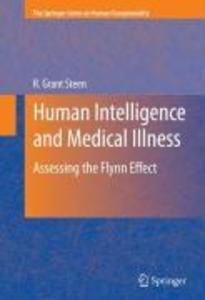
Sofort lieferbar (Download)
There's little doubt that people are growing smarter. This effect is so strong that IQ tests must be renormed periodically to prevent classifying an overabundance of people as geniuses. The question is why is this collective rise in IQ - known as the Flynn effect -occurring? Possible theories to explain the Flynn effect have ranged from better parenting to faster evolution.
Bringing a bold new voice to the debate, Human Intelligence and Medical Illness sets out a simple definition of intelligence that is appropriate for assessing intelligence at the population level. The definition is then used to probe the relationship between population intelligence and public health. This volume uses the latest medical and behavioral science research to argue that declines in serious disease and illness-causing conditions (e. g. , lead paint in buildings) correlate strongly with continued cognitive gains in both developed and developing countries. Current political realities explain why the Flynn effect should be approached as a public policy as well as a public health issue.
This provocative volume:
- Reviews the most widely held hypotheses accounting for the Flynn effect.
- Examines the relationship between intelligence and public health.
- Assesses the extent to which public health improvements can potentially account for the Flynn effect.
- Details how treatment of common medical problems may result in a substantial rise in IQ.
- Explores the possibility of continued IQ gains in the United States and worldwide.
- Reframes the Flynn effect in the contexts of public health, early childhood education, and social justice.
With its groundbreaking findings on the causes of cognitive impairment and the possibility of cognitive improvement, Human Intelligence and MedicalIllness is must-reading for researchers, professors, and graduate students in developmental psychology, education, public health, psychiatry, neuroscience, social work, and related fields.
Inhaltsverzeichnis
Are People Getting Smarter? . - Human IQ and Increasing Intelligence. - Evolution and Increasing Intelligence. - Brain Development and Increasing Intelligence. - Environment and Increasing Intelligence. - Evidence of Physical Plasticity in Humans. - Evidence of Mental Plasticity in Humans. - Evidence of Cognitive Plasticity in Humans. - Impact of Medical Conditions on Human IQ in the United States. - Impact of Medical Conditions on Human IQ Worldwide. - Medical Interventions for Cognitive Impairment. - Increasing IQ in the United States. - Increasing IQ and Social Justice.
Produktdetails
Erscheinungsdatum
16. September 2009
Sprache
englisch
Seitenanzahl
218
Dateigröße
1,81 MB
Reihe
The Springer Series on Human Exceptionality
Autor/Autorin
R. Grant Steen
Verlag/Hersteller
Kopierschutz
mit Wasserzeichen versehen
Produktart
EBOOK
Dateiformat
PDF
ISBN
9781441900920
Entdecken Sie mehr
Pressestimmen
From the reviews:
The 218-page volume is divided into 13 chapters on topics in human intelligence. Human Intelligence and Medical Illness should be commended for taking an evidence-based approach to the topic of intelligence . The book is concise, timely, and generally well written. Overall, Human Intelligence and Medical Illness is a thought-provoking book that is well worth reading. If you are interested in how to improve human intelligence, then this book is for you. (Richard E. Mayer, PsycCRITIQUES, Vol. 55 (4), January, 2010)
This book explores the nature of IQ testing, changes that have occurred, and conditions that can impact it. to provide readers with comprehensive information about intelligence testing, trends, and current literature. Clinical and school psychologists would find this book interesting, but others working in developmental fields also would find it of use. This is a superficial review of the intellectual issues presented. (Christopher J. Graver, Doody s Review Service, April, 2010)
The 218-page volume is divided into 13 chapters on topics in human intelligence. Human Intelligence and Medical Illness should be commended for taking an evidence-based approach to the topic of intelligence . The book is concise, timely, and generally well written. Overall, Human Intelligence and Medical Illness is a thought-provoking book that is well worth reading. If you are interested in how to improve human intelligence, then this book is for you. (Richard E. Mayer, PsycCRITIQUES, Vol. 55 (4), January, 2010)
This book explores the nature of IQ testing, changes that have occurred, and conditions that can impact it. to provide readers with comprehensive information about intelligence testing, trends, and current literature. Clinical and school psychologists would find this book interesting, but others working in developmental fields also would find it of use. This is a superficial review of the intellectual issues presented. (Christopher J. Graver, Doody s Review Service, April, 2010)
Bewertungen
0 Bewertungen
Es wurden noch keine Bewertungen abgegeben. Schreiben Sie die erste Bewertung zu "Human Intelligence and Medical Illness" und helfen Sie damit anderen bei der Kaufentscheidung.









